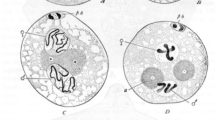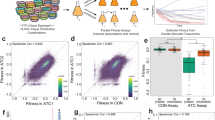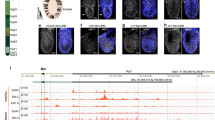Summary
By classical genetic experiments, evidence is provided that the male recombination factor, 31.1 MRF, has the ability to be transposed to another chromosome. The procedure by which the transposition occurs must be different from that of classical crossing over. It appears that transposition occurs only when the factor is active in male germ cells. Moreover, the factor appears to be able to undergo successive transpositions. Furthermore, the integration sites of the factor, when transposed into another chromosome, may not be completely random. Finally, the third chromosome of the 31.1/Cy L 4 strain can also induce male recombination.
Similar content being viewed by others
References
Fincham, J.R.S., Sastry, G.R.K.: Controlling elements in maize. Annu. Rev. Genet. 8, 15–50 (1974)
Green, M.M.: Controlling element mediated transposition of the white gene in Drosophila melanogaster. Genetics 61, 429–441 (1969)
Green, M.M.: Genetic instability in Drosophila melanogaster: De novo induction of putative insertion mutations. Proc. Natl. Acad. Sci. U.S.A. 74, 3490–3493 (1977)
Henderson, A.S., Woodruff, R.C., Thompson, J.N., Jr.: Spontaneous chromosome breakage at male meiosis associated with male recombination in Drosophila melanogaster. Genetics 88, 93–107 (1978)
Hiraizumi, Y.: Spontaneous recombination in Drosophila melanogaster males. Proc. Natl. Acad. Sci. U.S.A. 68, 268–270 (1971)
Hiraizumi, Y.: The relationships among transmission frequency, male recombination and progeny production in Drosophila melanogaster. Genet. Res. 30, 77–88 (1977)
Ising, G., Ramel, G.: The behavior of a transposing element in Drosophila melanogaster: The genetics and biology of Drosophila, pp. 947–954. London: Academic Press 1976
Kidwell, M.G., Kidwell, J.F.: Cytoplasmic-chromosome interactions in Drosophila melanogaster. Nature 253, 755–756 (1975a)
Kidwell, M.G., Kidwell, J.F.: Spontaneous male recombination and mutation in isogenic-derived chromosomes of Drosophila melanogaster. J. Hered. 6, 367–375 (1975b)
Kidwell, M.G., Kidwell, J.F., Ives, T.P.: Spontaneous nonreciprocal mutation and sterility in strain crosses of Drosophila melanogaster. Mutat. Res. 42, 89–98 (1977a)
Kidwell, M.G., Kidwell, J.F., Sved, J.A.: Hybrid dysgenesis in Drosophila melanogaster: A syndrome of aberrant traits including mutation, sterility and male recombination. Genetic 86, 813–833 (1977b)
Lindsley, D.L., Grell, E.H.: Genetic variation of Drosophila melanogaster. Carnegie Institute of Washington publication (1968)
Nevers, S.P., Saedler, H.: Transposable genetic elements as agents of gene instability and chromosomal rearrangements. Nature 268, 109–115 (1977)
Pélisson, A.: Non-Mendelian female sterility in Drosophila melanogaster: variations of chromosomal contamination when caused by chromosomes of various inducer efficiencies. Genet. Res. (Cambridge) 32, 113–122 (1978)
Picard, G.: Non-Mendelian female sterility in Drosophila melanogaster: Hereditary transmission of l factor. Genetics 83, 107–123 (1976)
Picard, G.: Non-Mendelian female sterility in Drosophila melanogaster. Further data on chromosomal contamination. Mol. Gen. Genet. 164, 235–247 (1978)
Picard, G., Bregliano, T.C., Butheton, A., Lavige, J.M., Pélisson, A., Kidwell, M.G.: Non-Mendelian female sterility and hybrid dysgenesis in Drosophila melanogaster. Genet. Res. (Cambridge) 32, 275–287 (1978)
Sinclair, D.A.R., Green, M.M.: Genetic instability in Drosophila melanogaster: The effect of male recombination (MR) chromosomes in females. Mol. Gen. Genet. 170, 219–227 (1979)
Slatko, B.E.: Evidence for newly induced genetic activity responsible for male recombination induction in Drosophila melanogaster. Genetics 90, 105–124 (1978)
Slatko, B.E., Hiraizumi, Y.: Mutation induction in the male recombination strains of Drosophila melanogaster. Genetics 75, 643–649 (1973)
Sved, J.A.: Hybrid dysgenesis in Drosophila melanogaster: a possible explanation in terms of spatial organization of chromosomes. Aust. J. Biol. Sci. 29, 375–386 (1976)
Voelker, R.A.: The genetics and cytology of a mutator factor in Drosophila melanogaster. Mutat. Res. 22 265–276 (1974)
Waddle, F.R., Oster, I.I.: Autosomal recombination in males of Drosophila melanogaster caused by a transmissible factor. J. Genet. 61, 177–183 (1974a)
Waddle, F.R., Oster, I.I.: Male recombination in Drosophila melanogaster: Multiple inducer? Genetics 77, s68–69 (1974b)
Yamaguchi, O., Mukai, T.: Variation of spontaneous occurrence rates of chromosomal aberration in the second chromosomes of Drosophila melanogaster. Genetics 78, 1209–1221 (1974)
Yannopoulos, G.: Studies on male recombination in a Southern Greek Drosophila melanogaster population. c) Chromosomal abnormalities at male meiosis. d) Cytoplasmic factor responsible for the reciprocal-cross effect. Genet. Res. 31, 187–196 (1978a)
Yannopoulos, G.: Progressive resistance against the male recombination factor 31.1 MRF acquired by Drosophila melanogaster. Experientia 34, 1000–1002 (1978b)
Yannopoulos, G.: Studies on the sterility induced by the male recombination factor 31.1 MRF in Drosophila melanogaster. Genet. Res. (Cambridge) 32, 239–247 (1978c)
Yannopoulos, G., Pelecanos, M.: Studies on male recombination in a Southern Greek Drosophila melanogaster population. a) Effect of temperature. b) Suppression of male recombination in reciprocal crosses. Genet. Res. (Cambridge) 29, 231–238 (1977)
Author information
Authors and Affiliations
Additional information
Communicated by M. Green
Rights and permissions
About this article
Cite this article
Yannopoulos, G. Ability of the male recombination factor 31.1 MRF to be transposed to another chromosome in Drosophila melanogaster . Molec. Gen. Genet. 176, 247–253 (1979). https://doi.org/10.1007/BF00273219
Received:
Issue Date:
DOI: https://doi.org/10.1007/BF00273219




